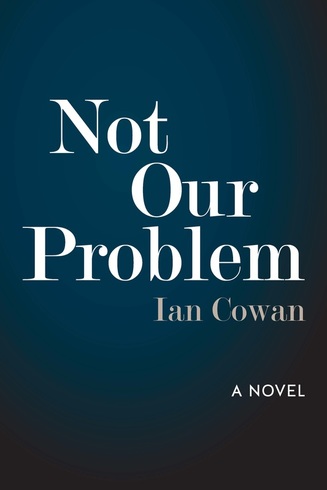 Not Our Problem
Not Our Problem by Ian Cowan
As a radiologist, Dr Ian Cowan probably does not wield a scalpel in his everyday work, but he has certainly done so in his outstanding debut novel Not Our Problem. The title is the first stroke of the scalpel, for it encapsulates precisely the dismissive, careless and reckless approach to problems created by the most self-centred of administrators for the most ignoble of reasons – saving a buck.
The background to Cowan’s story is the late eighties and early nineties, a time that vies with Cromwell’s Commonwealth for the title of ‘The world turned upside down’. In little more than a decade, New Zealand turned its back on a century of social progress based and founded upon that concept of fairness so dear to immigrant societies to become a land in which people mattered much less than profit. This occurred through the willingness, first of the Fourth Labour Government and then the gleeful connivance of the next and National administration in embracing the unrestrained Friedmanite free-market theories aimed at saving money that emerged from Thatcherite Britain and Reaganite America to become New Zealand’s ‘Rogernomics’.
Cowan’s hero, Dr Stephen Cassidy, is introduced as a surgical registrar driven by his marked professionalism to doubt his readiness to complete his journey to consultancy. At his lowest, physically and mentally, he seizes the chance of becoming involved in the heralded restructuring to which the NZ health system is about to be exposed and temporarily shelves his surgical career to become a liaison officer between ‘change managers’ (none of whom, by design and intent, know anything about health or medicine) and the clinicians of the fictitious Paxton Hospital.
Beginning from an acceptance that the ‘old’ system did in fact contain an amount of waste that was probably remediable, “I think I could make a real difference to these stupid mismanagement things…”, Cassidy fails to grasp the root-and-branch determination of the free-marketers that nihilism and not adaptation is the desired aim, and the book is dedicated to his journey through progressive stages of disillusionment set against the growing despair of his fellow clinicians.
During the journey he comes to hear patients classified as Revenue-gathering units or RGUs, and Revenue-losing units or RLUs, and Cowan cleverly captures the jargon of outcomes-focused management to etch his Friedmanite characters in all their unlovable glory, viz the “…downward flexibility in workforce numbers…” that euphemises cuts in nursing staff; the question asked of Cassidy “Does our scenario resonate with your agenda?” and perhaps the finest of all, “Steve, helicopter above your micro issues and see the bigger picture. Once we get the ducks in a row it’s going to be sensational…” which quite overlooks the fact that the main reason for getting ducks in a row is their easier slaughter.
As witnessed in the educational restructuring taking place at the same time in real-life New Zealand, however, the free-marketers never grasp the distinction between business and the social services, nor that the only way money can be saved with regard to the latter is to slow down its expenditure. When the difficulties overlooked in the initial free-market fanaticism become apparent, many of the apostles of change decide to do so elsewhere, bailing out to leave behind only chaos and mistrust for the free-marketers.
Cowan is at his most biting here, and properly so, for this reviewer underwent the same experience with the proponents of ‘market forces’ as they applied to education in the same period, so Cowan’s scenario certainly “…resonates with (my) agenda…” to bring back the doubt, uncertainty and lack of trust in leadership that turned so easily to despair in those days of knowing that the master-plan, if there was one, was seriously flawed.
Ian Cowan’s book is 267 pages of incisive social comment reminding us that we neglect at our peril the context of our daily concerns, and even evokes Edmund Burke’s aphorism that “In order for evil to flourish, all that is required is for good men to do nothing." References are carefully selected and very well laid-out to provide a convenient path through the story of those times that the author has recounted so very well.
As noted above, this is an outstanding debut novel.
Review by M J Burr
MA; MEd Admin.
MA; MEd Admin.
A Flaxflower Review
Title: Not Our Problem
Author: Ian Cowan
Publisher: Mary Egan Publishing
ISBN: 978-0-473-32696-8
Available: bookshops; www.iancowan.nz
Author: Ian Cowan
Publisher: Mary Egan Publishing
ISBN: 978-0-473-32696-8
Available: bookshops; www.iancowan.nz
No comments:
Post a Comment